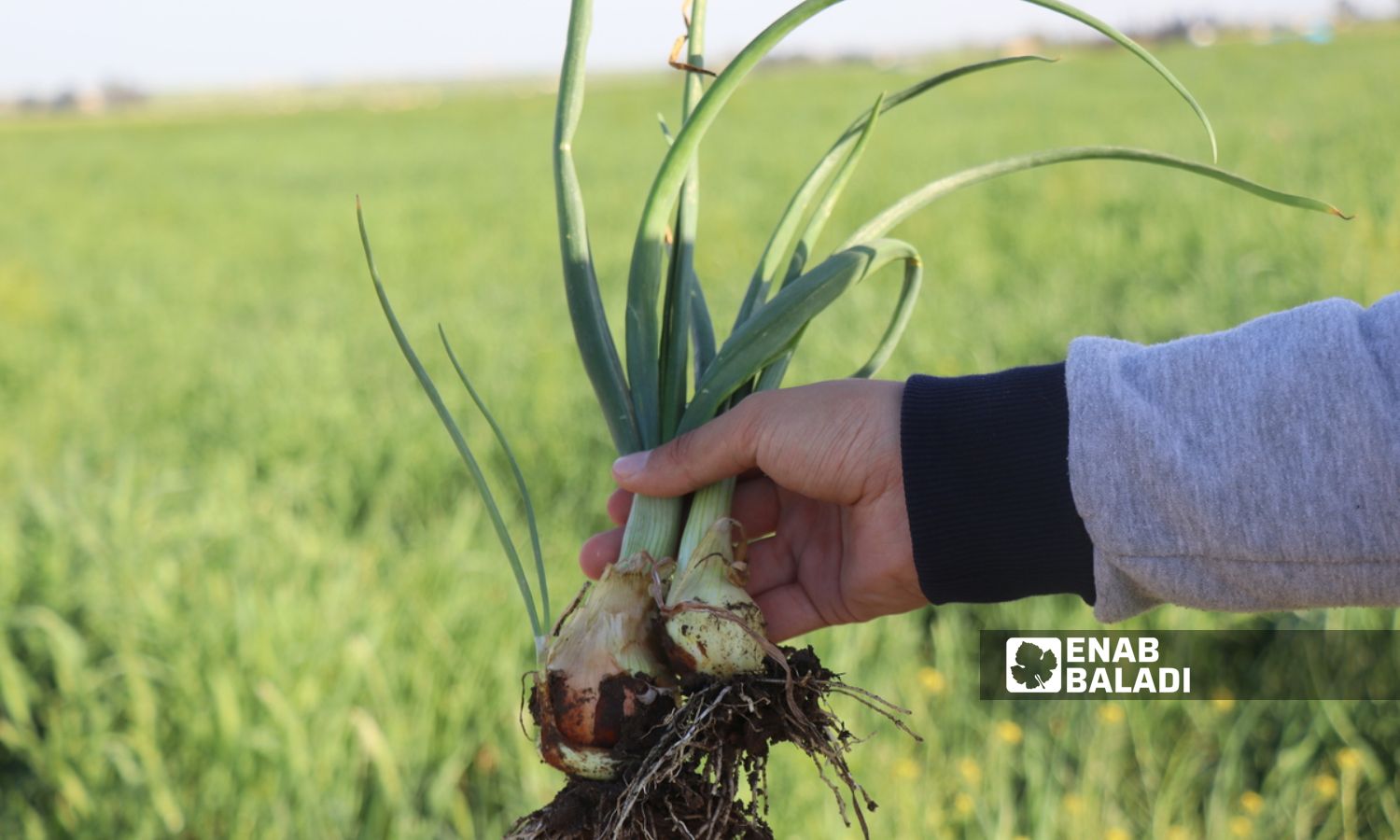



Enab Baladi – Ras al-Ain
The planted areas with onion crops in Ras al-Ain, northwest of al-Hasakah, have increased, with hopes of achieving profits after losses in wheat and cotton crops.
Farmers have resorted to onion cultivation to offset what they described as severe losses from the wheat and cotton crops in the previous season, due to their glut and lack of a market outlet, and traders controlling the pricing.
Onion cultivation in the region begins from mid-December and extends until early February, adding to the cumin crop, which has also expanded in the area.
Enab Baladi met with a number of farmers in Ras al-Ain who decided to grow onions, and asked them about the reasons and circumstances of its cultivation.
Ammar al-Hassoun, a farmer from al-Mubarakiyah village, explained to Enab Baladi that the 2023 wheat and cotton season brought financial losses due to the lack of markets to sell the crop, and wheat prices not exceeding $200 per ton and cotton at $550.
He stated that these prices are not proportional to farming costs, therefore he decided to cultivate onions on his 20-dunam land to benefit from its season.
He added that he chose to grow onions because it is a productive crop compared to other crops, and its price is acceptable if prices are not monopolized, noting that a ton can be sold for about five million Syrian pounds (about $336) if traders do not manipulate the prices.
Meanwhile, Haitham al-Shaker, another farmer from Mujaybirah village east of Ras al-Ain, told Enab Baladi that the current agricultural season is different from the previous one, as farmers benefited from the experiences of the past season and the necessity of diversifying crops, thus introducing the cultivation of aromatic plants like cumin, and other crops like onions.
He explained that he planted only 15 dunams of wheat, while planting 25 dunams of onions, and 40 dunams of cumin, noting that this year is the first he has planted onions on his land.
In the 2023 wheat harvest season in Ras al-Ain, farmers complained about the accumulation of the crop, as the Syrian Interim Government (SIG) only received small quantities of it, making them vulnerable to the monopoly and control of traders over their crops, due to the lack of suitable storage places and difficulties in maintaining the quality of the crop, leading to its spoilage.
The Interim Government then set the purchase price for a ton of pure hard wheat of the first grade at $330, but despite the price setting, farmers could not sell hard pure wheat for more than $220 per ton, and soft wheat at $150 per ton.
The Interim Government did not intervene in buying the cotton crop grown within its controlled areas, exposing farmers to significant losses, due to having to reduce sales prices, with the ton price ranging between $500 and $550, while in 2022 it ranged between $750 and $800.
Engineer Mohsen al-Omari told Enab Baladi that farmers are increasingly turning to new crops, seeking higher production and better prices.
He explained that onion cultivation was limited during 2023 to small areas between one and five dunams, while this year it was started on larger areas ranging between 15 and 30 dunams.
He added that introducing any new agricultural project to the Ras al-Ain area requires two things: suitable environmental and climatic conditions, and knowledge of farming methods and care.
He emphasized the importance of preparing and equipping the land before planting onions, using disease-free seeds from reliable sources, in addition to nitrogen and phosphorus fertilization.
Among the most common diseases affecting the onion crop are seed rot and death before germination, or death immediately after germination and before appearing above the ground surface, causing decay and rot in the crown area, leading to onion death and decay, according to the engineer.
Cultivating any new crop carries fears of financial losses, especially in Ras al-Ain, which has witnessed complaints from farmers about traders monopolizing the crop, and the Syrian Interim Government refraining from buying wheat.
The head of the Agriculture and Animal Wealth Office at the local council in Ras al-Ain, Omar Hammoud, explained to Enab Baladi that onion cultivation increased this year compared to the previous year, without an accurate statistic for the area, due to the high profitability that can be achieved from cultivating it compared to usual crops like wheat and barley.
He added that onions have high productivity, with production per dunam reaching at least three tons and up to five tons at maximum.
Despite the high production of onions, farmers’ fears remain, especially with the increase in planted areas, as this may lead to a glut and the absence of a market for selling them, according to Hammoud.
He mentioned that the price of hybrid onion seeds ranges between $20 and $25 per kilogram, where each dunam needs 1.2 kilograms, pointing out the necessity to provide specific places away from moisture and high heat to preserve it from spoilage in case of marketing difficulties.
Agriculture, along with livestock breeding, are the main occupations practiced by most of the population in the Ras al-Ain area, forming a primary source of income for the residents.
Ras al-Ain and Tel Abyad are located along the Turkish border, controlled by the Turkish-backed Syrian National Army (SNA), while surrounded by battlefronts with the Syrian Democratic Forces (SDF), with the Turkish border being its only outlet abroad.
if you think the article contain wrong information or you have additional details Send Correction